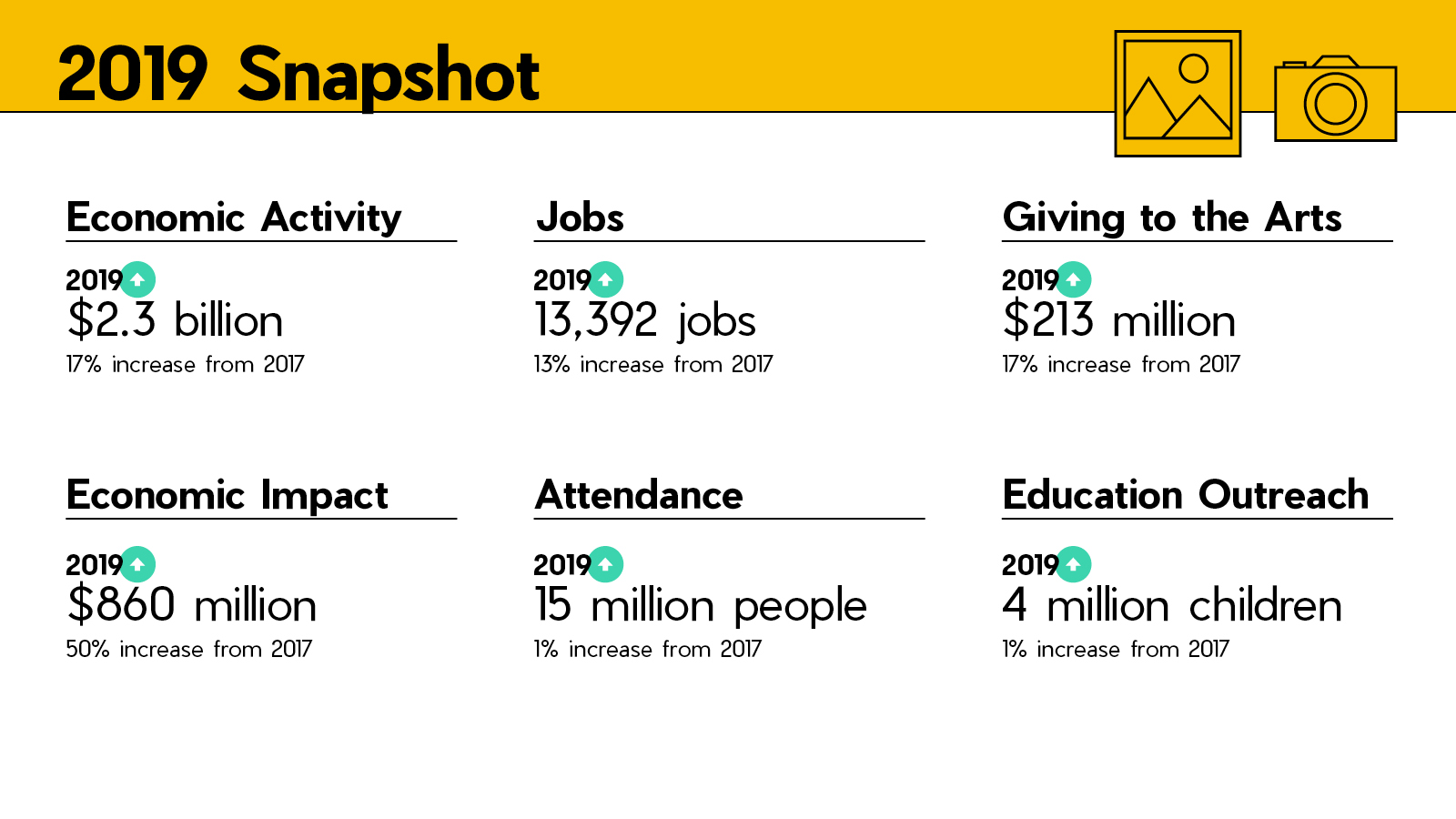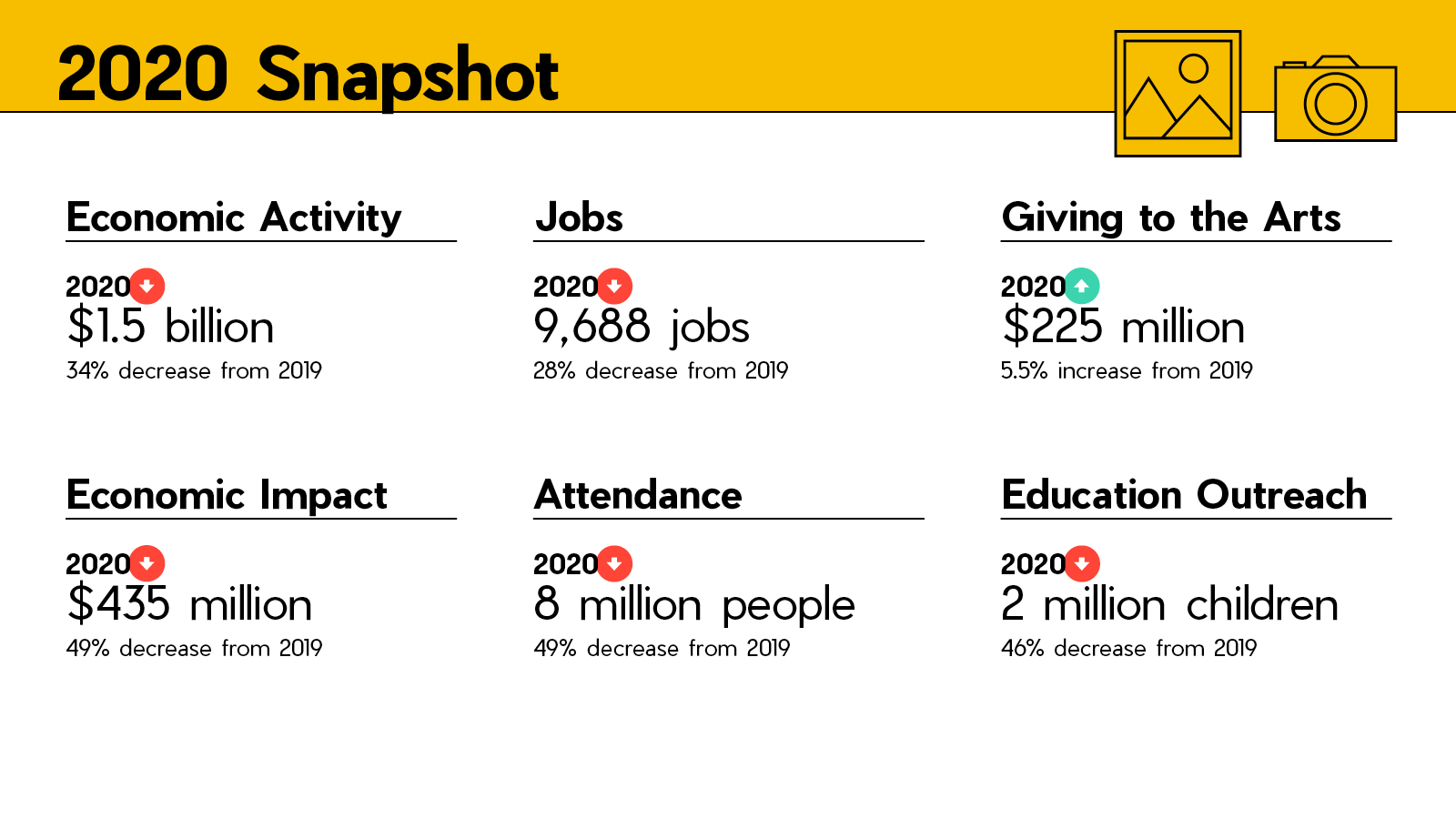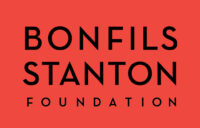Economic Activity Study of Metro Denver Culture Reports A Decade of Growth Lost as a Result of the Pandemic

By CBCA Press Release
The abrupt and devastating impact of the COVID-19 pandemic on the nonprofit cultural sector is clear, reversing a decade of growth in the Denver metro area, as evidenced by Colorado Business Committee for the Arts’ (CBCA) latest Economic Activity Study of Metro Denver Culture, presented by U.S. Bank.
This Economic Activity Study of Metro Denver Culture was calculated using data from the 2019 and 2020 calendar years. Data was self-reported by the nearly 300 arts, culture and scientific organizations funded by the Scientific and Cultural Facilities District (SCFD) in a seven-county region: Adams, Arapahoe, Boulder, Broomfield, Denver, Douglas and Jefferson. CBCA has been reporting on the financial and social relevance of the arts for 28 years.
“Arts, culture and scientific organizations are the backbone of a vibrant, resilient and inclusive society. CBCA’s 2021 Economic Activity Study of Metro Denver Culture illustrates years of record-breaking cultural growth, which hit an all-time high in 2019, and conversely in 2020, how a community responds to drastic and disruptive circumstances,” said Christin Crampton Day, executive director of CBCA.
With two years of comparative data, plus a longitudinal analytical model, CBCA was able to track changes over time.
Arts and cultural activity reached a peak in 2019, breaking records for economic activity and impact. Economic activity, which comprises direct and indirect spending from operations, audiences and capital projects, reached $2.3 billion in 2019, the highest amount reported by CBCA. Economic impact, a segment of total activity that accounts for “new money” to the region, also reached a new height at $860 million.
The arts sector lost a decade of growth in 2020 due to the COVID-19 pandemic. The temporary closure of venues and stay-at-home orders starting in March 2020 had a sudden and severe impact on the arts community. Key metrics like jobs and attendance were reduced to levels from the last recession or lower.
Investments in new facilities, renovations and capital campaigns boosted overall economic activity and impact in 2019 and into 2020. There was a 272% increase from 2017 to 2019 in the economic impact of capital expenditures. Several of those projects continued into 2020, despite indoor spaces remaining closed during the pandemic.
Individual giving and government grants increased significantly in 2020. These sources helped to cover major losses in earned revenue and corporate event sponsorships as a result of the pandemic. Individual giving increased 14% from 2019 to 2020, and federal grants increased by a record-breaking 420% in 2020. In general, philanthropy and public support for the arts is the only key metric that went up (5.5%) between 2019 and 2020.
“One bright spot of the 2020 data reported was that philanthropy and giving to arts and culture in the metro region is up, which provides hope and critical funding needed for the ongoing economic recovery of the nonprofit arts sector,” Crampton Day added. “This report will be a vital advocacy tool to ensure arts and culture endure so we can build back stronger.”
Throughout the uncertainty of 2020, public funds through the Scientific and Cultural Facilities District (SCFD) proved to be a vital stabilizing force. SCFD is a seven-county special tax district that funds arts, cultural and scientific organizations. Cultural funding through SCFD has steadily increased over the last decade, breaking another record in 2019. Based on the data in this study, funding through the SCFD only declined 1% between 2019 and 2020.
The full report can be found on CBCA’s website: http://cbca.org/2021-economic-activity-study. In addition to the interactive digital report, there is a downloadable summary in English and Spanish and a more detailed whitepaper.
CBCA released the 2021 Economic Activity Study of Metro Denver Culture on November 4 at an arts-infused happy hour event at ReelWorks in the RiNo Arts District, attended by over 300 corporate, cultural and civic leaders, as well as elected officials and livestream viewers.
Featured speakers at the roll-out event included Colorado State Representative Leslie Herod, Mayor of Northglenn Meredith Leighty, Mayor of Lone Tree Jackie Millet and U.S. Bank’s Colorado Market President Andy Aye. There was a dynamic panel discussion with Gino Greco, SCFD Board Chair; Tariana Navas-Nieves, Director, Cultural Affairs, Denver Arts & Venues; Malik Robinson, Executive Director, Cleo Parker Robinson Dance; Deven Shaff, Broomfield City Council; John Tayer, President & CEO, Boulder Chamber; and moderated by John Moore, veteran arts journalist and founder of Denver Actors Fund. There were also live performances by CM Dance, Pro Musica Colorado Chamber Orchestra/Colorado Chamber Players and Phamaly Theatre Company. Full event program can be found here.
CBCA staff are able to present this data in-person or via webinar to chambers of commerce, economic development councils, city councils, boards of directors, businesses, or other civic groups across the region. Contact main@cbca.org if interested in scheduling a presentation for your group of this latest economic impact study.
Thank you to the Presenting Sponsor, U.S. Bank, for making this report and roll-out event possible. As well as appreciation to all the sponsors: Pinnacol Assurance, Colorado Educational and Cultural Facilities Authority (CECFA), Employers Council, Forte Commercial Real Estate, Scientific and Cultural Facilities District (SCFD) and VISIT DENVER. Thank you to the in-kind partners for supporting the study and event: DualDraw, Footers Catering, The Publishing House, Ratio Beerworks and Total Wine.



